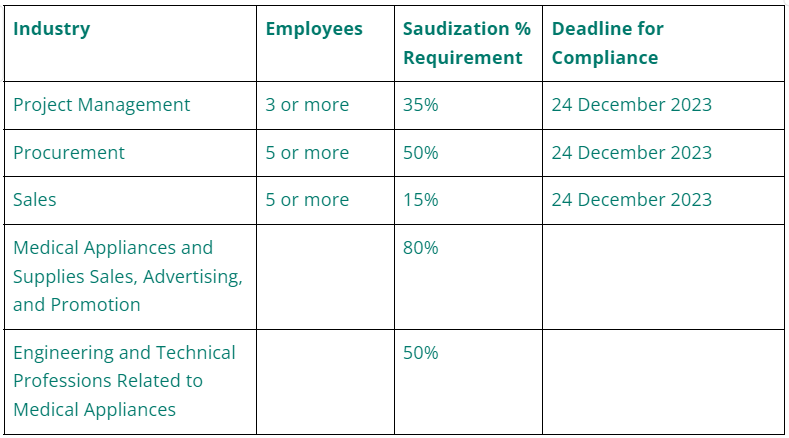![]()
Ready To Start Hiring?
Successful hiring starts with a simple step
As a KSA employer, you’re likely familiar with the challenge of balancing Saudisation requirements with your business needs. Finding the right talent, adhering to government quotas, and maintaining operational efficiency can seem like a daunting task. This blog aims to simplify Saudisation for you, offering a strategic playbook tailored to your needs.
Saudization is a strategic initiative by the Saudi government to boost employment of Saudi nationals in the private sector. While this policy supports economic diversification, it also introduces new complexities for employers in terms of compliance and workforce management.
Here, we will explore the Saudisation program’s objectives, mandatory quotas, and the Nitaqat system, shedding light on the compliance requirements and incentives available to businesses. Continue reading to learn more!
Here are a few important things about Saudisation as part of the future of work in MENA.
From the employer’s viewpoint, the history of Saudisation and the Nitaqat system is a story of revolutionary government attempts to transform the Saudi labor market. The official policy by the Ministry of Labor and Social Development, known as Nitaqat, is an attempt to lessen Saudi Arabia’s long-standing reliance on foreign labor in the private sector.
The Saudi government has hired only Saudi nationals for specific positions to combat the country’s high unemployment rates over the years. Furthermore, updates regularly influence the range of professions available to Saudi nationals, adjusting the specific percentage of Saudi labor needed. This ensures a dynamic and evolving environment for Saudi employers.
Employers must follow the Nitaqat system rules under Saudisation.
Saudization rules apply to all companies, even those with fewer than ten employees, who must still hire at least one Saudi national. The government uses this classification to monitor companies, ensuring they follow Saudization rules and imposing incentives or penalties accordingly. Furthermore, exclusive perks, like a rapid visa service, are reserved for companies in the Platinum Zone. Therefore, for employers, understanding and complying with Saudization rules is crucial for success in this new system.
Interestingly, the authorities have reserved over 90 professions exclusively for Saudi nationals. But here’s the twist: many of these roles are more on the junior side. That said, there are some great opportunities for Saudis in areas like human resources, labor affairs, specific sales specialties, and certain finance positions.
If a candidate inquires about a position potentially earmarked for a Saudi national, the employer can address any concerns by discussing the candidate’s visa (Iqama) status. Consequently, this reflects the dynamic nature of the Saudi employment landscape. It shows that they are willing to adapt to the evolving opportunities and regulations aligned with the nation’s Vision 2030 goals.
Now, let’s dive into the impact of Saudisation on various industries from the perspective of us, the employers.
Recently, the Saudi Ministry of Human Resources and Social Development (MHRSD) has been going full throttle on implementing the Vision 2030 strategy, even amidst the COVID-19 challenges. The goal? To create more job opportunities for Saudi nationals in the private sector by focusing on certain roles, professions, and economic sectors for nationalization.
As the nationalization initiative extends its reach, it increasingly impacts sectors and professions that demand higher qualifications. Thus, with the Saudi workforce becoming more educated and experienced, this trend is in place for continued growth.

As employers, it is important to plan your future workforce strategically. You must also carefully ensure the appropriate representation of Saudi nationals in designated roles. Therefore, this proactive approach involves careful assessment and adjustment to align with the evolving landscape of nationalization and the Vision 2030 goals.
Despite the challenges, employing Saudi nationals offers numerous benefits. It’s an investment in the local economy and aligns your business with national development goals. Bayt.com’s database of over 2.5 million Saudi professionals can help you meet your Saudization goals effectively. We streamline the recruitment process, ensuring you find the right talent while staying compliant.
Embracing Saudization is not just about meeting quotas; it’s about contributing to the Kingdom’s broader vision. With the right approach and resources, Saudization can become a key driver of your business’s success in the KSA.
![]()
Successful hiring starts with a simple step